RT26 CPCS Blue Card Renewal Mock Test with 128 Questions and Answers / A26 MEWP Boom / Cherry Picker
£15.00 Original price was: £15.00.£9.95Current price is: £9.95.
100% PASS the A26 RT26 MEWP Boom CPCS Blue Card Test with our Thorough 128-question Mock Practice
- Questions & Answers: based on the latest RT 26 M.E.W.P. Boom – CPCS Renewal Test Revision FACTSHEET
- Categories: A26 MEWP Boom
- You can also renew this extra category with the same test: A25 M.E.W.P. Scissor
- Number of Multiple-choice Questions: 128
- Format: PDF
- Delivery time: Instant download after checkout
- Refunds: No refunds once downloaded, unless you ordered duplicates by mistake.
If there are any issues with your download, please email CardRenewalTest@gmail.com and we’ll send it ASAP
Master Your CPCS Blue Card Renewal with Our RT26 MEWP Boom Mock Practice Test
Renewing your CPCS Blue Card is not just a formality; it’s an opportunity to showcase your commitment to safety and competence as a cherry-picker operator. If you’re aiming to extend your card for another five years, you’ve come to the right place. At cardrenewaltest.co.uk, we understand the challenges you may face in preparing for the CPCS Blue Card Renewal test. That’s why we’ve crafted a comprehensive RT26 MEWP Boom CPCS Blue Card Renewal Mock Practice Test to make your preparation seamless and effective.
Why Renewal Matters:
Your CPCS Blue Card is a testament to your proficiency in operating Mobile Elevating Work Platforms (MEWPs) like Cherry Pickers. As the expiration date approaches, it’s crucial to renew your card promptly. Failure to do so may not only lead to a lapse in your certification but could also impact your employability, putting you at a disadvantage in the competitive job market.
The Challenge of Renewal:
Renewing your CPCS Blue Card involves passing a renewal test (RT26 for MEWP Boom). For many operators, this can be a daunting task. The renewal test assesses your knowledge of safety procedures, operational best practices, and compliance with the latest standards outlined in the NOCN CPCS RT26 MEWP Boom factsheet.
The Solution: RT26 MEWP Boom CPCS Blue Card Renewal Mock Practice Test
Our mock practice test is meticulously designed to mirror the format and content of the actual CPCS Blue Card Renewal test. Here’s why you need it:
1. Realistic Practice Environment:
- Familiarize yourself with the structure and format of the actual renewal test.
- Get accustomed to multiple-choice questions, just like the ones you’ll encounter in the real exam.
2. Comprehensive Coverage:
- Covering all key areas from the latest NOCN CPCS RT26 MEWP Boom factsheet.
- Gain confidence in your understanding of crucial topics related to MEWP operation and safety.
3. Efficient Learning:
- No need to sift through lengthy texts. Our mock test condenses essential information into bite-sized questions and answers.
- Focus on targeted learning to maximize your preparation time.
4. Immediate Feedback:
- Receive instant feedback on your performance.
- Understand correct answers and explanations for any questions you may have missed.
How to Pass the CPCS Blue Card Renewal Test:
- Access the Mock Practice Test: Visit our website and find the RT26 MEWP Boom CPCS Blue Card Renewal Mock Practice Test.
- Study Smart: Use the test as a diagnostic tool. Identify areas where you need improvement and revisit the NOCN CPCS RT26 factsheet for further clarification.
- Practice Regularly: Consistent practice builds confidence. Make the mock test a regular part of your study routine.
- Simulate Exam Conditions: Mimic exam conditions by setting a timer and creating a distraction-free environment. This helps enhance your test-taking skills.
- Review and Adjust: After each practice session, review your performance, understand the correct answers, and adjust your study focus accordingly.
Conclusion:
Renewing your CPCS Blue Card doesn’t have to be overwhelming. Our RT26 MEWP Boom CPCS Blue Card Renewal Mock Practice Test is your key to a successful renewal journey. It’s not just about passing the test; it’s about reaffirming your commitment to safety, competence, and professional growth. Start your preparation today, and confidently stride into the renewal test knowing you’ve mastered the essentials.
Remember, your safety knowledge is not just a requirement; it’s a responsibility. Best of luck with your renewal!
These are some of the main points from the RT26 M.E.W.P. Boom Factsheet:
Preparation for Work (Preparation):
- Boom-type mobile elevated work platforms (MEWPs) allow access at height and reach, and in some cases, below the MEWP chassis.
- The rotating upper structure and boom can be mounted on a trailer, vehicle chassis, or its own self-propelled chassis.
- Thorough pre-use checks, following the manufacturer’s requirements, are essential and found in the operator’s manual and machine decals.
- Familiarization training specific to the type being operated is necessary, in addition to basic training on the class of MEWPs.
- Emergency lowering system, safety stop buttons, and limit switches must be checked before work starts.
- The turntable lock or brake must be applied before traveling to prevent instability.
Stability:
- MEWP booms work on the counterbalanced principle, overcoming the weight exerted by the boom and platform.
- Counterweights and stabilizers aid stability but cannot prevent overturning in certain parameters.
- Unlevel chassis on uneven ground with a raised boom can cause instability and overturn.
- Heavy rain can turn firm ground into soft ground, requiring checks before work starts.
- Proper planning of minimum distances is crucial when working near edges of slopes or trenches.
Working Safely and With Others (Working Safely):
- Self-propelled MEWPs are commonly used in construction, requiring awareness of the direction of travel.
- Operators should avoid leaning over exposed control panels to prevent inadvertent activation.
- Weight restrictions for the working platform, including people, tools, and equipment, must be observed.
- Tools should not obstruct operating controls to ensure proper functioning.
- Operators must be aware of weather conditions, including wind speed, and shut down operations if it exceeds manufacturer criteria.
- Hazards must be identified, and control measures applied, such as maintaining distances from power lines and segregating working areas from moving vehicles.
Working at Height and in Restricted Areas (Working at Height):
- Consider ground-level work first to avoid unnecessary work at height.
- Procedures for summoning assistance and locating the operating key in the ground-level control panel must be in place.
- Fall arrest or fall restraint equipment is required for those working at height.
- The type of fall arrest equipment and its compatibility with the machine should be checked against the manufacturer’s data.
- The sequence of positioning a platform at height is crucial for stability.
These learning points cover a range of topics, including preparation, stability, working safely, and considerations for working at height and in restricted areas. Operators should thoroughly understand these concepts to ensure safe and effective operation of MEWPs.
1 review for RT26 CPCS Blue Card Renewal Mock Test with 128 Questions and Answers / A26 MEWP Boom / Cherry Picker
Add a review Cancel reply
Related products
CPCS Blue Card Renewal Tests
RT19 CPCS Blue Card Renewal Mock Test with 123 Questions and Answers / A19 Grader
CPCS Blue Card Renewal Tests
RT66 CPCS Blue Card Renewal Mock Test with 133 Questions and Answers / A66 Compact Crane
CPCS Blue Card Renewal Tests
RT49 CPCS Blue Card Renewal Mock Test with 141 Questions and Answers / A49 Loader Securer non STGO
CPCS Blue Card Renewal Tests
RT05 CPCS Blue Card Renewal Mock Test with 105 Questions and Answers / A05 Dragline
CPCS Blue Card Renewal Tests
CPCS Blue Card Renewal Tests
RT41 CPCS Blue Card Renewal Mock Test with 118 Questions and Answers / A41 Loader Compressor
CPCS Blue Card Renewal Tests
CPCS Blue Card Renewal Tests
RT65 CPCS Blue Card Renewal Mock Test with 133 Questions and Answers / A65 Demolition Plant




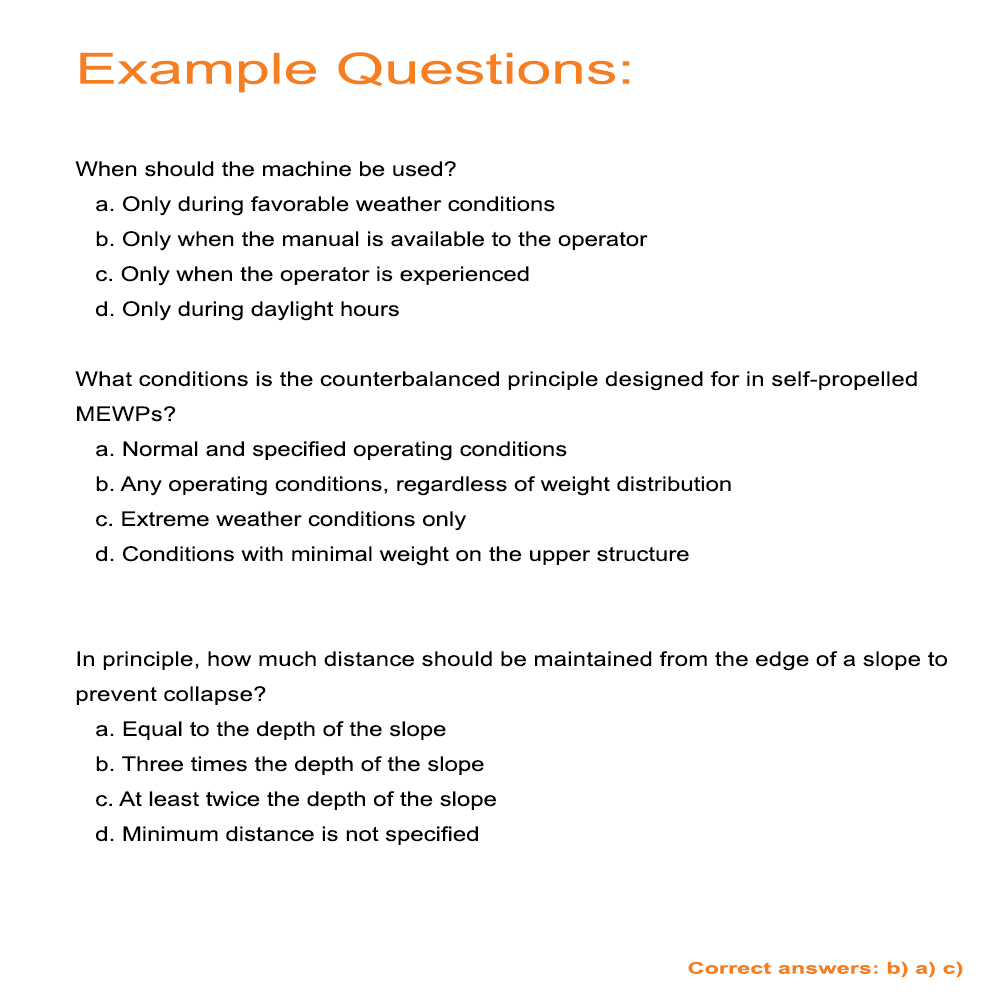
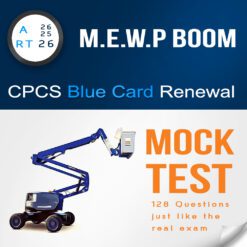
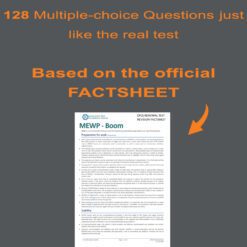
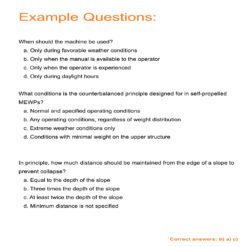

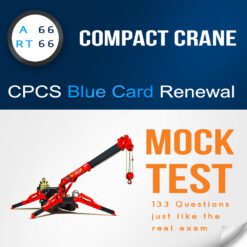
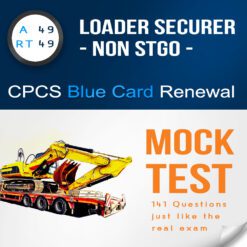
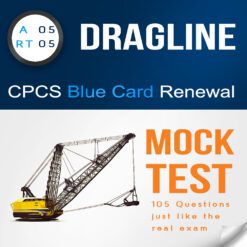
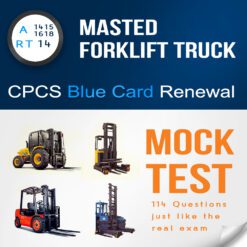
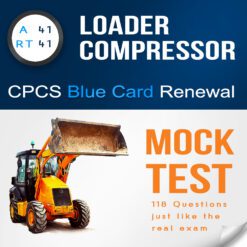
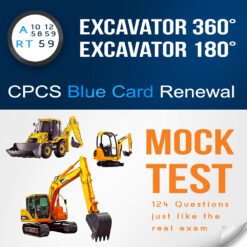


Sumatra –
Good stuff i recommend